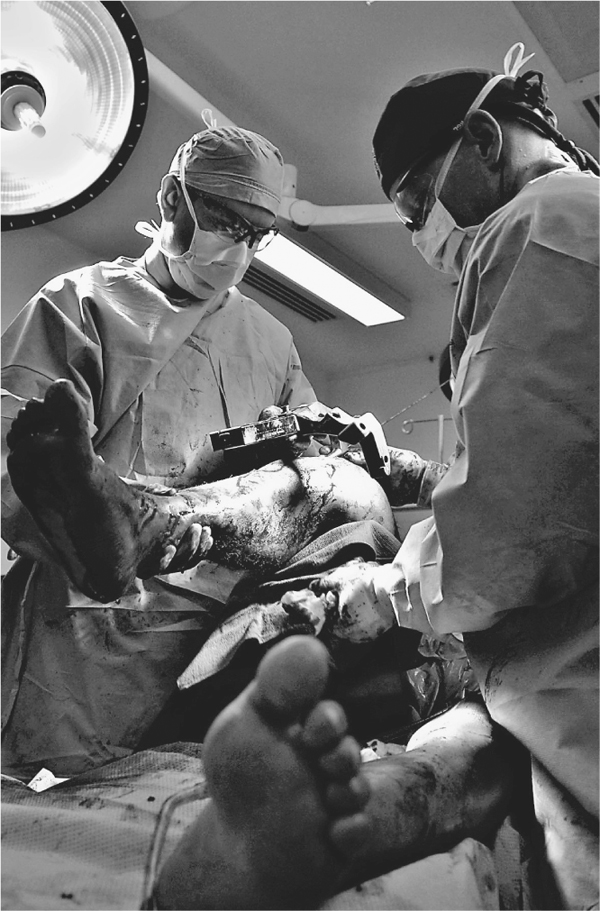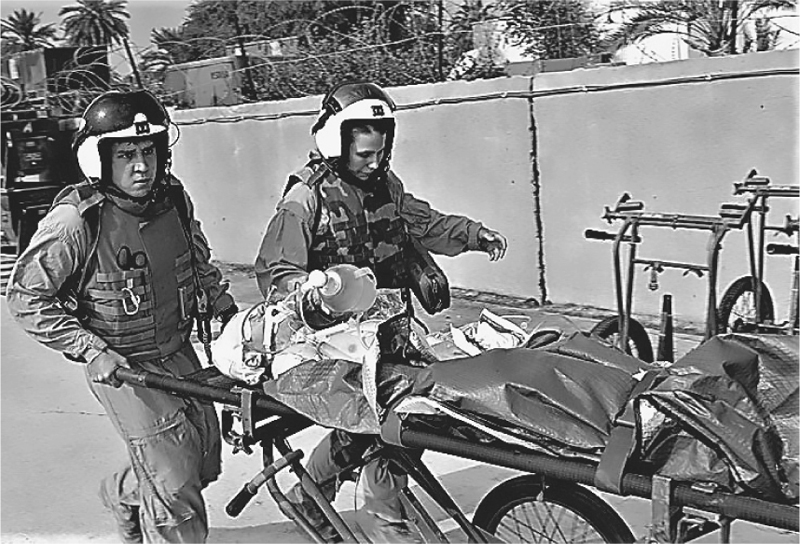Three Special Guys of the Many Patients at Landstuhl
Irounded every morning in the ICU at LRMC (Landstuhl Regional Medical Center) with the large gaggle of attendings, residents, and hospital staff. This particular morning, the lead trauma surgeon was commenting that he had been up the night before trying to save this patient’s right leg. The soldier had been in an explosion caused by an unmounted improvised explosive device (IED) and had lost his left leg. His right leg had been injured in the explosion and fragments of his own femur had lacerated his right leg’s blood supply. Although the downrange physicians had sewn the vein and initially saved the blood supply, the movement had jostled other bone fragments loose and had torn the fragile vessel, requiring the midnight surgical intervention.
Jonathan was resting quietly while the group discussed his care. As the group started to move to the next patient, I looked in at Jonathan one more time. This time we made eye contact and I decided to stop in and chat with him. I explained, “It’s normal for the group to discuss each case in the morning. We aren’t talking about you, but we are talking about you.”
Raising his eyebrow and looking at me quizzically, he stated, “Either I’m under the influence or you don’t make sense.”
I laughed. “Probably a little of both. How are you doing?”
“Not bad,” was his answer.
“I’m the aerovac doctor. It’s my job to make sure you get home safe and sound.”
He was polite and thanked me and I returned to the pack.
Jonathan was manifested to fly on the mission the next day. However, late that night he had trouble with his revascularization, and they went back to the operating room. He spent another two days with us in the ICU. The following day my arthritis was flaring so badly I needed my cane. As I puttered through the ICU with my cane, Jonathan called out to me. I peeked into his room and was met with an uneasy look.

The trauma surgeon had been up the night before trying to save this patient’s right leg. The soldier had been in an explosion caused by an IED. His right leg had been injured in the explosion and fragments of his own femur had lacerated his right leg’s blood supply. AIR FORCE PHOTO
“Are you okay?” He was concerned about me.
“Thank you, but don’t worry, I’m just getting older,” I joked.
He smiled and appeared relieved. Internally I paused. Here was a wounded warrior worried about me. What a kind heart this young man had. His parents would be proud. Again we manifested Jonathan for the next mission. A couple of hours later, though, the blood supply to Jonathan’s leg clotted off and there was nothing to do but amputate. The right leg, the one the surgeons had tried to save, was no longer viable. The following morning I rushed to his side and gave him a hug.
“Oh, Jonathan, I’m so sad to hear of the loss of your leg.”
He looked surprised and said, “Which one?”
“The one we’ve been trying to save,” I stammered.
“Oh, it’s okay. It hurt anyway,” he replied. “Now I can get on with getting better!”
After that we chatted for a while. He was manifested again and this time I saw him off at the plane. As I reminisce about that day, I realize that Jonathan was named appropriately. His name means “gift of God,” and he had definitely been my gift that day. He would be just fine.

After rounds in the ICU one morning I stopped in to see Lieutenant Lee. The LT was leading his men when he stepped on an IED and lost both legs. Lee was sitting up in the bed talking to his nurse when I peeked in the door.
“Come on in,” invited the soldier.
“Hey. I’m the aerovac doctor. It’s my job to make sure you get home safe and sound. How are you doing today?” I smiled.
“Feeling blessed, ma’am.” He returned the smile.
“Glad to hear. How’s your head?”
“Still attached,” he quipped. “Why do you ask?”
“Just wondered if it got injured in the explosion,” I continued. One of the many sad things about war is the traumatic brain injury (TBI). We check every patient. It also helps to know if their brain is injured when we’re communicating with the patient, because they can have difficulty understanding our instructions.
The LT and I talked for a while longer. Within a very few minutes I realized he was a sharp, positive, charming, charismatic young man, one of those people whom I would gladly assist any time. I went about my day with a warm fuzzy inside. When I returned to my office a couple of hours later, my staff had been receiving calls from some high-ranking officers in Washington, DC, inquiring about the LT. They wanted to make sure we were going to get him on the next flight. Actually they seemed kind of bossy about it. We give everyone quality care and for someone to tell me how to do my job . . . yes, I was offended. I am human. Plus the LT was so nice, how could we not bend over backwards helping him?!
Later that day I returned to the ICU and stopped in to see the LT. He was on Skype and he asked me to come around and say hi to his father. I half expected some gruff higher-ranking officer as I peeked around the screen. Instead I saw a soft-faced, concerned father, frightened for his child. And as I listened to their conversation and interactions, I began to sympathize with Colonel Lee. After an appropriate time I started to leave. The LT was telling his dad not to worry, that he had it under control.
I turned and smiled. “Cut your dad some slack LT. His son just got hurt.” I winked.
“Yes ma’am,” was the crisp reply.
One patient advocate once told me that there are three sides to every story. You just have to hear the other person’s point of view. I still find it amusing that in the same day, I went from being frustrated with some seemingly overbearing colonel to being sympathetic with a fellow parent.

The medevac flight brought in several wounded to the emergency room early that morning. As the more critical patients were triaged through and trundled off to the operating room, I was left behind with delayed and minimal wounded. Some were sent off for laboratory studies and others sent to radiology while I began working through the soldiers sitting on the bench. Along the way I met Jack Potts.
“What a great name!” I smiled.
“I like it. My dad and my granddad share the name too.”
“What brings you to my ER?” I asked. That question allowed him the opportunity to talk, to narrate the events that led to his fractured leg. Jack required large amounts of morphine to get pain relief, but that only lasted a very short time. I checked the splint, the foot, the skin, everything I could think of, and then asked if he had received any valium or muscle relaxant.

After the patients arrived on the medevac flight, they were rushed to the field hospital and quickly triaged. MARINE CORPS PHOTO
“Oh no, ma’am.” He seemed alarmed. “I don’t need valium.”
“But you are using morphine,” I countered.
“That’s for pain. Valium is for anxiety. I’m not panicky. I’m just in pain.”
“Valium is a muscle relaxant. The muscle is attached to the tibia and your tibia is in three different pieces. A muscle relaxant would help. Can you trust me on this one?”
A puzzled expression passed his face and then he nodded, “I can take an order, ma’am. I’m a good Marine.”
“All right, then. It’s this doctor’s order for you to try one dose of valium.” And so Jack took one dose of valium.
Fifteen minutes later, I walked past his cot and he caught my eye. “Any better, Jack?” I asked.
“You were right, ma’am.”
I couldn’t hide my smile.
—Lt. Col. Gail Fancher
Sometimes obstacles and setbacks require course corrections that lead to crossroads in life. Some fear making a choice and never move on; others discover a path they never knew existed. . . .